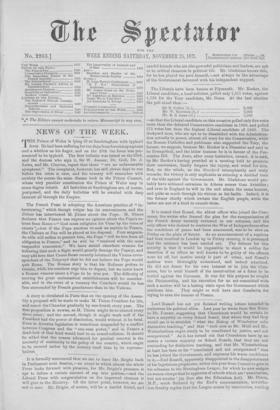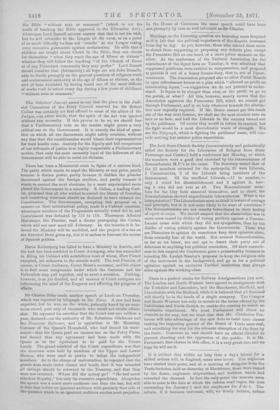Lord Russell has not yet finished writing letters intended to
embarrass his political allies. Last year he wrote from San Remo to Mr. Forster, suggesting that Churchmen would be certain to have a majority on every School board, that where they had they would use it to establish "what the Bishop of Winchester calls distinctive teaching," and that "such men as Mr. Miall and Mr. Wiuterbotham ought surely to be conciliated by justice, and not overpowered." As it has turned out that Churchmen have by no means a certain majority on School Boards, that they are not contending for distinctive teaching, and that Mr. Winterbothatn at least has been so far conciliated and not overpowered" that be has joined the Government, and expresses his warm confidence in it,—Earl Russell, apparently disappointed in the disappointment of his lugubrious prophecies, writes this year from Cannes to give in hie adhesion to the Birmingham League, for which he now assigns no reason except that be approves of schools which are' unsectarian, but not secular' (as does also the Education Act). Mr. Dixon, M.P., much flattered by the Earl's communication, neverthe- less frankly replies that the League means by unsectarian, reading the Bible "without note or comment " (which is not the mode of teaching the Bible approved in the Education Act) ; whereupon Lord Russell returns answer that that is not his wish, but he will subscribe to the League all the same, as on a point of so much difficulty he sloes not 'wonder' at the League taking even excessive guarantees against sectarianism. He adds that if children are taught about Christ in the Bible, they can choose for themselves " when they reach the age of fifteen or sixteen " whether they will follow the teaching "of the Church of Rome or of any Protestant community they may prefer." Lord Russell should consider that (fortunately) all boys are not John Russells, able to decide promptly on the gravest questions of religious truth and ecclesiastical authority at the age of fifteen or sixteen, on the sort of data furnished by having heard one of the most difficult of works read in school every day during a few years of childhood "without note or comment."



































